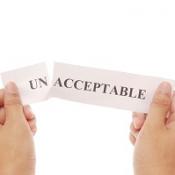 If you’ve ever been lucky enough to spend time with a pair of friends who both enjoy a healthy self-esteem, you’ve noticed how positive their relationship tends to be.
If you’ve ever been lucky enough to spend time with a pair of friends who both enjoy a healthy self-esteem, you’ve noticed how positive their relationship tends to be.
High-self-esteem friendships have the following qualities:
- The relationship is based on mutual affection and respect.
- Competition is low and support is high.
- Interactions are positive more often than negative.
- Disagreements don’t put the friendship in jeopardy.
- Apologies are heartfelt on both sides.
High self-esteem always includes esteem for others, too. Unlike arrogance, conceit, egotism, or self-centeredness, which are sometimes mistaken for high self-esteem, authentic self-esteem celebrates our shared humanity. People with genuine self-esteem make those around them feel good.
Since it promotes connection and closeness between friends, high self-esteem friendships are nurturing. The bond of self- and other-esteem makes both friends feel safe and comfortable.
Unfortunately, safe and comfortable is not how people feel when their self-esteem is injured. In fact, those with low self-esteem typically operate on a perpetual setting of unsafe and uncomfortable. You might think this would mean that they would leap at the chance to be friends with people with high self-esteem, because the high self-esteemers could help them feel safe and comfortable for a change.
This is not what happens.
What happens is that people become friends with those whose self-esteem most closely matches their own. So folks suffering with low self-esteem tend to attract others with the same problem. Similarly, like that old saying, “The rich get richer,” people with high self-esteem stick together. Here are these lucky people who already enjoy the pleasures of high self-esteem, and they get to have nurturing, satisfying, close relationships with their friends.
Meanwhile, those whose self-esteem has them constantly questioning their own worth, feeling unsafe and uncomfortable in relationships, stick to what is familiar by having friendships in which they can never feel truly safe and comfortable. By safe, I’m talking mostly about psychological safety rather than physical safety. But regardless of the kind of safety, we all seek familiarity. If we grew up feeling unsafe and uncomfortable, we’d keep getting drawn into situations that help us stay with what we know—in this case, lack of safety and comfort.
If this sounds at all familiar to you, here are some tips to help you break the cycle of unfulfilling friendships and low self-esteem:
Try not to take disagreements personally. If your friend doesn’t agree with you, or has a strong opinion that’s different from yours, it doesn’t mean you’re wrong, or even that he/she believes you’re wrong. It’s just as likely that your friend is worried that he’s/she’s wrong, and his/her strong language is just a mask to hide that fact. Refuse to feel smaller than your friend. Try not to be too sensitive to what he/she says.
Take the risk of losing the friendship if necessary. When you are continually stood up, ridiculed, or criticized, take the risk of letting your friend know how you feel, and why. If they value the relationship enough to change how they treat you, you’ll have improved your friendship. If they don’t have enough respect for themselves or you to respond appropriately, you will not have lost anything when you walk away.
Do not put up with verbal abuse. Create a boundary that is fixed, firm, and final, and share that boundary. For instance: “If you make a remark about my body one more time, I’m going home.” Be prepared to have your boundary tested, because it will be. Make sure you follow through with exactly what you said you would do, 100% of the time. If you don’t follow through, you must accept some responsibility for the treatment you continue to receive.
Realize that having a friend is not always better than having no friends. The best friend you have, or should have, is you. Yes, it’s a cliche: Be your own best friend. But like all cliches, it’s based on something true: as long as you’re there for yourself, you’re never alone. Having a friend who brings you down instead of building you up is more harmful than having no friends for a while.
Explore the possibility of sharing more of yourself. Sometimes our relationships are psychologically safer than we realize. That is, with some friends it might actually be okay to let our guard down a bit, and share your more intimate, vulnerable sides.
- If you normally listen rather than talk, try talking about how you feel to a friend with whom you feel comfortable.
- If you normally talk about, but don’t typically show, your emotions, try showing them.
- Allow your tears to come if they want to.
- Don’t stop talking when your voice shakes.
- Let a friend see you sweat when you’re nervous.
- Notice when you’re not being yourself around your friend.
You are normal. You are okay. You’re interesting and valuable exactly as you are. There is nothing wrong with you. Look to your friendships to help convince you of these things. Lose or change those friendships that don’t.

The preceding article was solely written by the author named above. Any views and opinions expressed are not necessarily shared by GoodTherapy.org. Questions or concerns about the preceding article can be directed to the author or posted as a comment below.

 Self-Esteem vs. Self-Criticism
Self-Esteem vs. Self-Criticism Three Simple Ways to Build Self-Esteem
Three Simple Ways to Build Self-Esteem Negative Self-Beliefs: Are You a 'Beaten Dog'?
Negative Self-Beliefs: Are You a 'Beaten Dog'?

